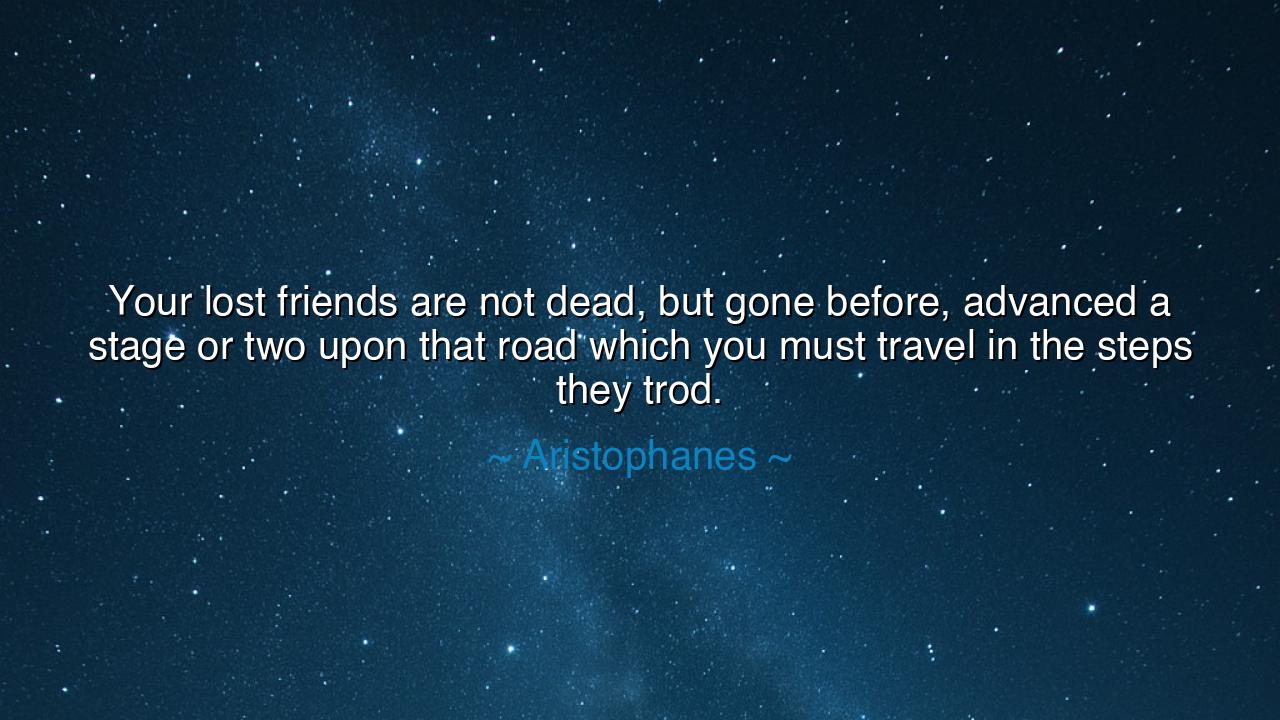
Your lost friends are not dead, but gone before, advanced a
Your lost friends are not dead, but gone before, advanced a stage or two upon that road which you must travel in the steps they trod.






The words of Aristophanes — “Your lost friends are not dead, but gone before, advanced a stage or two upon that road which you must travel in the steps they trod” — carry a solemn majesty that rings through the ages. They speak not merely of sorrow, but of the mystery of human passage, the eternal march that binds the living and the departed in one unbroken procession. To call a friend lost is only the language of grief; in truth, they are not extinguished, but carried onward, walking a little further than we upon the same eternal path.
The ancients knew that life was not severed at the grave, but rather transformed. To them, death was not a shattering, but a crossing — a stage in the grand drama of existence. Aristophanes, though a comic poet, here sounds a voice that is solemn and eternal, reminding us that those who vanish from our sight are not erased. They have only reached a milestone we too must meet. Their footsteps mark the way, and in time our feet shall press the same earth, our spirits shall taste the same passage.
Consider the tale of Pericles, the great leader of Athens. When the plague swept through the city, it stole from him both his sons. To any man this would have been a ruin beyond bearing. And yet, when his heart was shattered, he did not cry out that his children were destroyed forever. Instead, he bore himself with dignity, understanding that they had only gone before him, that they had walked further down that same road which all mortals must travel. His grief was vast, but his strength arose from the knowledge that he was not separated from them forever, but only delayed in joining them.
So too in our own lives, when we stand by the graveside of those we love, let us remember that they are not dead, but advanced. Like soldiers on a march, they have gone ahead to prepare the way. Their silence is not abandonment; it is the hush of scouts who move before the main host. We, who yet remain, follow in time. To despair utterly is to deny the sacred fellowship of the journey, for their life was not quenched, only hidden from our mortal sight.
And what lesson, then, should we draw? First, that grief is holy, but despair is not. To mourn is the rightful tribute of love, but to surrender to hopelessness is to betray both the living and the departed. The ancients remind us: we must live worthily in the days granted to us, for those who went before watch as unseen witnesses. Their steps are the pattern, their lives the guiding torch, urging us to walk with courage and honor until our own journey draws us nearer to them.
Practically, let each of us honor the memory of those gone not with empty wailing, but with noble action. Live as they would have wished you to live. Speak their names with reverence, recall their deeds with pride, and let your life become the continuation of theirs. When despair whispers, answer it with purpose. When loneliness gnaws, answer it with service. For in this way, their presence abides in your actions, and their march continues through your strength.
Remember also that we walk together even now. The fellowship of mankind is not broken by death, but deepened by it. We stand in a column that stretches both backward and forward through time — ancestors before us, descendants behind us. Your lost friends are simply a few ranks ahead, their banners no longer visible in the dust, but their path certain, and your footsteps destined to find it.
Therefore, take courage, O traveler. Do not call them lost, but advanced. Do not call them dead, but gone before. For the day shall come when you, too, set your feet upon that road, and when you do, you will find them waiting — their faces alight, their voices lifted, welcoming you to the company of eternity.






AAdministratorAdministrator
Welcome, honored guests. Please leave a comment, we will respond soon